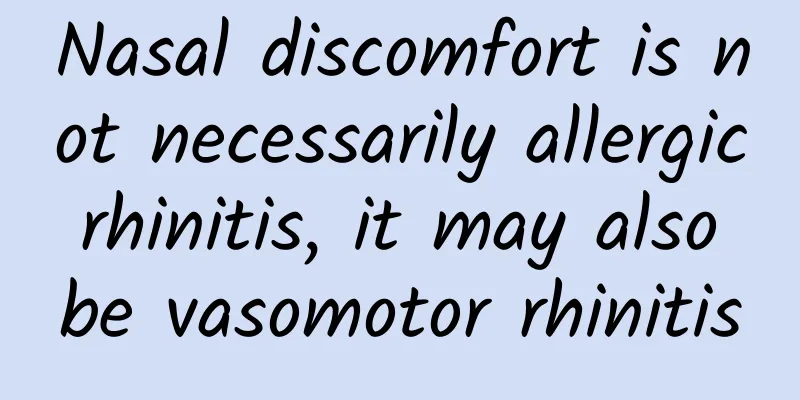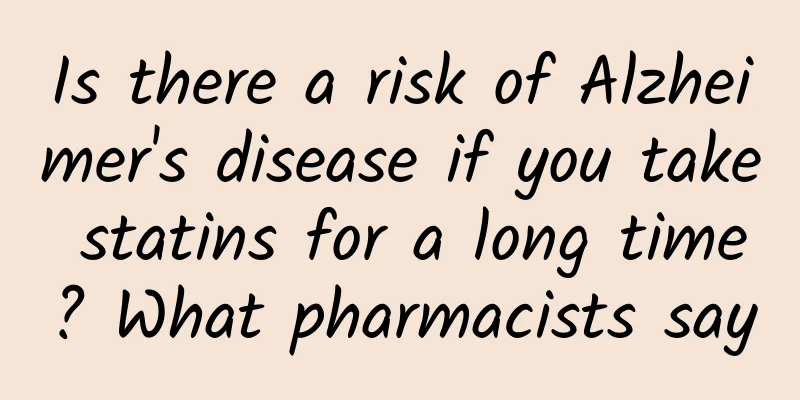Nasal discomfort is not necessarily allergic rhinitis, it may also be vasomotor rhinitis

|
Huazi went to the park with his friends. He wore a mask the whole time and looked listless. Huazi told his friends that they didn't need to wear a mask all the time because they were outdoors and there weren't many people gathering. His friend said that he had been feeling uncomfortable in his nose for the past few days. It might be allergic rhinitis. He took anti-allergic drugs for a few days, but it didn't work. He felt groggy all day long. Huazi told his friend that the common causes of nasal discomfort are not necessarily allergic rhinitis, but may also be vasomotor rhinitis. If it is the latter, anti-allergic treatment may not be effective, but instead the patient will have to endure the side effect of drowsiness caused by the drug. 1. There are two common types of chronic rhinitis. One is the well-known allergic rhinitis, and the other is vasomotor rhinitis. The symptoms of the two are very similar, both of which cause nasal congestion and runny nose. However, the pathogenic factors of the two are different, and the treatment is also different. 1. Allergic rhinitis: Under the stimulation of external allergens, the human body produces an allergic reaction, which stimulates the nasal mucosa and causes an inflammatory reaction. In addition to runny nose and nasal congestion, it is also accompanied by symptoms such as itchy nose, itchy eyes, itchy throat, and constant sneezing. Usually, clear allergens can be detected. 2. Vasomotor rhinitis: Stimulation by temperature changes, smelling a certain special odor, or eating overheated or spicy food may stimulate the nasal mucosal nerves, leading to increased secretion of neurotransmitters and the emergence of rhinitis symptoms, mainly runny nose, nasal congestion, and sneezing, but generally there is no obvious itching and allergens cannot be detected. Second, the treatment methods of the two are not exactly the same. For the treatment of allergic rhinitis, anti-allergic drugs can be used. However, anti-allergic drugs have an impact on the central nervous system, causing adverse reactions such as drowsiness and affecting daily life. Drugs with less impact on the central nervous system, such as desloratadine and levocetirizine, can be used. You can use decongestants locally in the nasal cavity to relieve the symptoms of nasal congestion, but be careful not to use them continuously for more than 3 days, otherwise it may cause drug-induced rhinitis. You can also use topical glucocorticoids locally in the nasal cavity to reduce inflammation and relieve nasal congestion symptoms. The treatment of vasomotor rhinitis is not an allergic disease, so oral anti-allergic drugs are ineffective. It is mainly treated symptomatically with drugs such as topical decongestants, glucocorticoids, and highly selective M receptor blockers to relieve symptoms of nasal congestion and runny nose. Both types of patients may have complications such as nasal structural deformities such as nasal concha hypertrophy and nasal septum deviation. In this case, they need to undergo surgery to remove the hypertrophic nasal concha or undergo correction to effectively relieve the symptoms. 3. Prevention of disease is the most important thing. Allergic rhinitis and vasomotor rhinitis both occur under clear triggers. The triggering factor of the former is specific allergens, while the triggering factor of the latter is nasal contact with irritants. Therefore, from the perspective of the disease attack mechanism, as long as the triggering factors can be avoided, the onset of the disease can be prevented. To prevent allergic rhinitis, you can detect allergens and try to isolate yourself from them. If you have seasonal allergic rhinitis, you should go out less during the season when the disease attacks, and wear a mask when you go out. You can also go to the hospital for desensitization treatment to help yourself increase your tolerance to allergens and reduce attacks. To prevent vasomotor rhinitis, try to avoid contact with irritants. The common cause is the change of temperature in the environment. For example, when it is cold, many people will have a runny nose or nasal congestion. You can wear a mask to increase the warmth of the nose. In terms of diet, you should eat less hot, spicy and other irritating foods to avoid irritation to the nasopharyngeal nerves. Rinsing the nasal cavity every morning and evening can relieve the symptoms of both diseases. It is recommended to use normal saline or normal seawater for rinsing before taking the medicine, which has low irritation to the nasal mucosa and can also enhance the effect of the medicine. To sum up, if your nose is uncomfortable, there are two common reasons, one is allergic rhinitis and the other is vasomotor rhinitis, and the treatment methods of the two are different. However, some people may have both types of rhinitis. It is recommended to see a doctor for examination and use medication under the doctor's guidance. If you have any questions about medication, please consult a doctor or pharmacist in time. I am pharmacist Huazi. Welcome to follow me and share more health knowledge. |
<<: When are clams at their fattest? Why do live clams open when placed in the refrigerator?
>>: What are the characteristics of clams? Can you eat clams without opening them?
Recommend
Is it good to have teeth cleaning during pregnancy?
There are many things you cannot do when you are ...
What to do if you have a headache after drinking? What to eat after drinking? Tips on how to sober up
At the end of the year and the beginning of the n...
Fetal movement is low at 36 weeks of pregnancy
There will be subtle changes every week of pregna...
What is the difference between tampons and sanitary napkins?
Tampons and sanitary napkins are both very privat...
There are some important things to pay attention to when it comes to dinner time. Not only does it help control blood sugar, but there are many benefits to adjusting it!
Did you know that dinner is more than just the la...
Underwear has a fishy smell
We all know that no matter it is a man or a woman...
Urethra bleeding but no pain
There is a small round hole above the vulva and j...
What to do if your menstrual period is dark, has blood clots, and has dysmenorrhea
Nowadays, most female friends will have those few...
What causes pimples under the armpits of pregnant women?
If a pregnant woman has pimples under her armpits...
How to marinate chicken gizzards for hot pot? Can chicken gizzards be used for hot pot?
Everyone loves to eat hot pot, but it is recommen...
What happens if the leucorrhea is stringy before menstruation?
Nowadays, women suffer from many gynecological di...
What is the principle of breast enhancement in traditional Chinese medicine?
Today, more and more people choose breast augment...
How to relieve eye fatigue from watching videos, watching TV series, and playing games every day?
《Cotton Swab Medical Science Popularization》 Depa...
What should I pay attention to when my vaginal discharge is bloody during the non-ovulation period?
In fact, we all know that women experience menstr...









